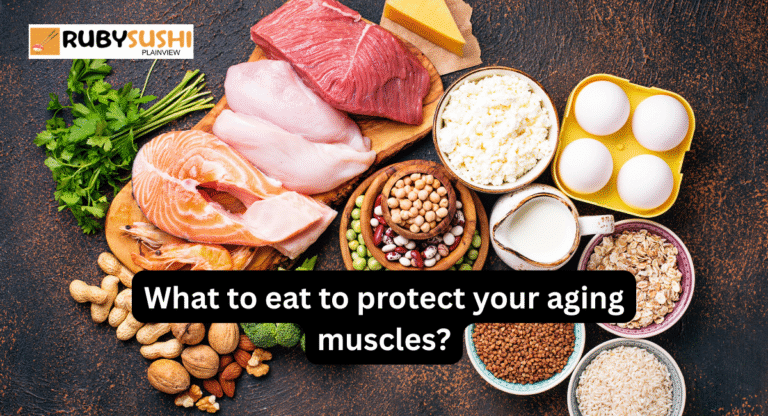
Have you noticed that you feel weaker than you used to? Is it hard for you to climb stairs or carry groceries? It could be because of losing muscle mass.
As people get older, they often lose muscle mass and strength. Sarcopenia, which is the loss of a lot of muscle, can make you sick or kill you.
You can’t stop all of the muscle loss that happens as you get older, but you can slow it down and make yourself stronger. You probably already know that lifting weights helps you build and keep muscle. People don’t often talk about diet when it comes to keeping muscles strong. A UT Austin nutritional sciences research scientist says, “Diet is important because you can’t get stronger without eating right.” “Diet is important.”
To gain muscle and feel stronger, follow these diet tips.
Increase the Amount of Protein you Eat
According to the assistant professor, protein is important for building and keeping muscle. The National Academy of Sciences says that adults should eat 0.36 grams of protein for every pound of body weight they have. According to an analysis of data from the National Health and Nutrition Examination Survey, 42% of men and 50% of women over 70 do not get enough.
The assistant professor says that some experts say older adults should eat even more protein to make up for the loss of muscle and the fact that it’s harder to build new muscle as you get older. If you weigh 160 pounds, you should eat between 72 and 94 grams of protein every day, or 0.45 to 0.59 grams per pound. If you have kidney disease, talk to your doctor about how much protein you should eat because too much can put a lot of stress on your kidneys. Dietitians say that eating protein at different times of the day can help your body absorb it better, but an assistant professor says that the most important thing is to eat enough.
The main researcher for Pennsylvania State University’s Health, Ingestive Behavior, and Technology A lab says it doesn’t matter where you get your protein from when you want to build muscle. Plant-based foods have less in each serving than animal-based foods. On the other hand, beans, nuts, and tofu are good sources of plant-based protein that can help improve other aspects of health.
Eating a whole-food, plant-based diet is good for your heart and brain and lowers your risk of some cancers. “It also seems to be easier on the kidneys as we get older than a diet high in animal protein,” says a clinical dietitian at UNC Health Care System in Chapel Hill.
A cup of tofu has 20 grams of protein, a cup of lentils, white beans, or edamame has 18 grams, a cup of quinoa or whole-wheat pasta has 8 grams, and an ounce of peanuts has 7 grams. Three ounces of chicken or beef breast have 24 grams of protein. A cup of low-fat milk has 8 grams, an egg has 6 grams, and a 5.5-ounce serving of plain nonfat Greek yogurt has 16 grams.
Get Enough Calories
The assistant professor says, “If you don’t get enough calories, your body will break down muscle.” People of different heights, weights, genders, and activity levels need different amounts of calories. But in general, 1,800 to 2,400 calories a day is enough.
Choose Glucose of High Quality
Carbohydrates can make you stronger because they give your muscles energy. Whole grains, legumes, fruits, and vegetables are the best sources of omega-3s. Refined carbs like white bread, crackers, soda, and desserts give you energy for a short time. Unlike high-quality carbohydrates, refined carbohydrates don’t have fiber or other nutrients.
Fiber may help build or keep muscle mass by increasing the number of gut bacteria that make short-chain fatty acids. These compounds are needed for muscle growth.
Make Sure You Get Enough Vitamin D
Some studies have found a link between vitamin D levels and muscle strength, but it’s not clear if eating more vitamin D or taking a supplement will make you stronger. The assistant professor, on the other hand, says that you should take 20 micrograms (800 IU) of the vitamin every day because it is important for your bones, muscles, and general health. The Endocrine Society no longer recommends that healthy adults get routine vitamin D tests. You should talk to your doctor about what you need for your health.
Add Omega-3s
These fats are found in fish, and they may help keep your muscles from losing strength as you get older. A 2020 review of sarcopenia research by Nutrients found that eating fatty fish made muscles bigger and stronger. Other studies have found similar benefits from omega-3 supplements, but the evidence is not clear. The American Heart Association says that eating two servings of fatty fish like salmon or sardines every week is good for your heart.
Drink Plenty of Water
The assistant professor said that drinking enough fluids is good for your health and your muscles. When muscle cells don’t have enough water, it can make older people weaker, make it harder for them to do everyday tasks, and make them more frail. These changes have been linked to not having enough water in muscle, which is 70–75% water. It’s clear that water is good for you, but you may also obtain fluids from coffee, tea, milk, fruits, vegetables, and soup.
Talk to Your Doctor About Creatine
This substance is made by your body and is found in meat, seafood, and muscle tissue. But some people might find that pills or powders help. The assistant professor said that creatine makes energy in muscles, especially in the first one to two seconds of a contraction. More creatine in the muscle will make the first contraction phase better, that’s true.
Athletes mostly use creatine to get better at their sport, but older people may also benefit. The Journal of Clinical Medicine published a review in 2019 that said creatine and strength training can lower the risk of sarcopenia and falls. You also need muscle to keep your balance.
The assistant professor says, “In general, I’m pretty against supplements.” Creatine, on the other hand, is a cheap and safe supplement. Will it make a difference in someone? Not always, but it might give you more energy to work out or get up from a chair.
Thinking About How Important Strength Training is
To keep your muscles healthy, you need to work out. But this doesn’t mean you have to start bodybuilding in your 60s, 70s, or even later to get stronger. Masterson says that walking and simple strength-training exercises like chair squats and wall push-ups can help keep your bones and muscles strong. Being active and moving around more is also good.
Read More: Should You Eat Raw Oysters? Here’s the Truth



